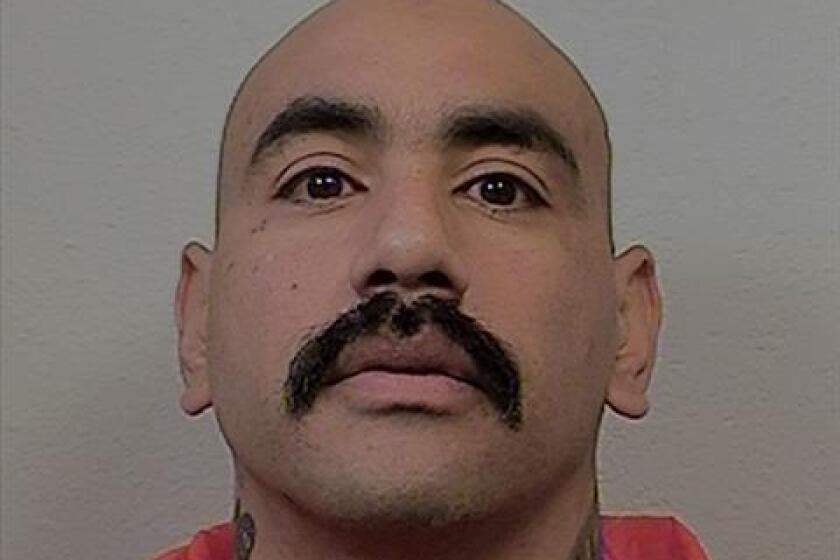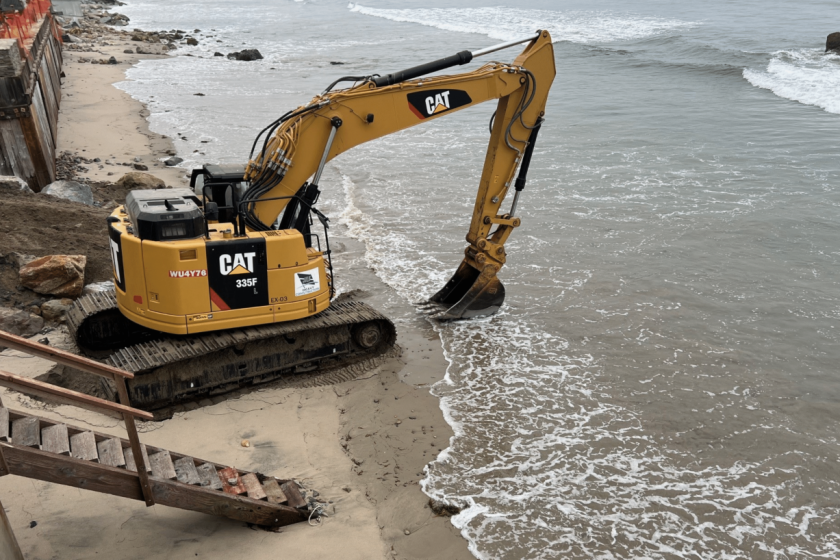N.Y. Courtroom Tiger Stalks New Prey in O.C. : Law: Aggressive lawyer for ex-client mob don John Gotti comes west to defend Aissa Wayne’s ex-husband.
Lawyer Bruce Cutler is ticked off.
For one thing, he figures he’s the subject of a federal investigation. For another, his former client, convicted Mafia leader John Gotti, is likely to spend the rest of his life behind bars. Then there’s the problem of his current client, Thomas Gionis, who has just gone on trial for a second time for allegedly ordering the beating of his ex-wife and her boyfriend.
But right now what Bruce Cutler is really steamed about is the no-smoking rule in the Orange County Courthouse.
“What is it here with this not being able to smoke in the corridor? Where are you supposed to pace and smoke?”
Grumbling all the way, Cutler walks out onto the 11th-floor balcony and lights up a True.
It’s just one of the differences between California and his native New York that are making the 43-year-old Cutler feel like a Cadillac in a world of Jaguars. This is a guy who is as New York as a Central Park mugging.
So when he’s stuck in the wide open spaces of sprawling, skyscraper-less Orange County for nearly a month, he thinks, “This is like--and you’ll appreciate this--Suffolk county, way out there. Like Hauppage or someplace.” Nowheresville, in other words.
Then why is he here?
Try money and fame.
Money, because Gionis, 38, is an orthopedic surgeon who can afford high-priced legal talent. Fame, because Gionis’ ex-wife is Aissa Wayne, a woman who, as the prosecutor put it, is “the daughter of the actor, the late, great John Wayne.”
Gionis is charged with two counts of conspiracy and two counts of assault on Wayne, 35, and her then-boyfriend, Roger Luby, 56. The prosecution contends that Gionis ordered an attack through a private investigator he was using to gather evidence in a battle for custody of his and Wayne’s daughter, who was little more than a year old at the time.
The Pomona surgeon’s first trial ended with a jury hung 9 to 3 in favor of conviction. He had F. Lee Bailey for a lawyer at a preliminary hearing, and John D. Barnett, who is defending one of the policemen charged in the Rodney King case in Los Angeles, as a lawyer at his first trial.
Cutler freely admits he wouldn’t be in Santa Ana if there were no connection to John Wayne. He says he has turned down other wealthy defendants. This case, though, comes with built-in news coverage, a Cutler magnet.
The 1988 assault got so much publicity that even today, nearly all the jurors remembered hearing about it. The new Courtroom Television Network, which broadcasts trials like the Rodney King beating and the William Kennedy Smith rape case nationwide, is covering its first Orange County trial because of Wayne--and Cutler.
The lawyer says Gionis “came to me from day one,” when he was being investigated for the attack but “even before he was arrested.” Gionis “said he’d read about me, he liked my style, he liked the way I fought the John Gotti trial.” But Cutler then was busy defending Gotti in another trial.
Gionis says he wanted Cutler “because he’s the best,” though he won’t say how many dollars he threw at Cutler to lure him westward. Cutler grins that it’s “not much.”
Still, Cutler and an associate have been staying in the pricey Four Seasons Hotel in Newport Beach since the beginning of April. Gionis also provides a car--often a stretch limo--and chauffeur to get them to and from court each day.
Somehow the limo seems appropriate for Cutler. He wears custom-made shirts--he does have an 18 1/2-inch neck--suits with price tags over $1,000 and ties costing close to $100. The lighter though, is a 99-cent Bic. Nice touch.
A while back, he gave up fighting baldness and now has what little hair he has left on the sides clipped to a Marine Corps stubble.
The clothes and the strut make him look a lot like his most famous client, the man who is the reason Cutler has been profiled on “60 Minutes” and written up in Vanity Fair, GQ and a host of other magazines and newspapers.
That client is John Gotti, “the dapper don,” “the Teflon don,” the head of the Gambino organized crime family, acquitted all three times Cutler defended him but now in the slammer after a judge refused to let Cutler defend him any more.
The judge last year agreed with a federal prosecutor that Cutler had in effect become “house counsel” for the Gambino family and that he would have a conflict of interest because he and another lawyer--also barred--had defended people who might be witnesses in Gotti’s latest trial.
Cutler first represented Gotti at a 1985 arraignment. At the time, Gotti was unknown to the public, a lesser figure behind Aniello Dellacroce. But Dellacroce died, the next head of the Gambino family was shot to death outside a Manhattan steak house in December of 1985 and Gotti became head of the family. Cutler stayed at his side, inside court and sometimes outside.
Cutler calls himself Gotti’s “counselor, confidant and friend. That’s what I feel a criminal lawyer is supposed to be.”
He and Gotti “had a meeting of the minds and a symbiosis with regard to fighting the government,” Cutler said. Gotti “has got a great deal of personal integrity and strength of character, which is something that I like. He’s self-educated, grew up dirt poor, one of 11 children. We got along very well from the start and have remained that way.”
According to testimony at his trials, Gotti has also taken part in, directed or at least sanctioned murder, extortion, burglary, robbery and savage beatings.
Cutler says that Gotti has always “denied any participation or membership in what the government calls La Cosa Nostra” or the Mafia. “That’s always been our position, and I guess it always will be.”
But on secretly recorded audiotapes played at Gotti’s trial this year, the gangster is heard saying there is a Cosa Nostra, and it will last long after he’s gone. (He’s also heard complaining about his lawyers’ fees and calling them “high-priced errand boys.”)
Cutler replies that Gotti’s statements “were taken totally out of context. . . . My interpretation of the tapes was not the same as the government’s interpretation.”
Cutler, like Gotti, grew up in Brooklyn. His father went to law school but became a New York City policeman when he couldn’t get work as an attorney after his 1940 graduation. Eventually he did practice law and still does, Cutler says.
Flatbush-born Cutler was an undefeated wrestler at his Brooklyn high school, then went off to Hamilton College, in Clinton, N.Y. It’s a pretty little village, near Utica, with a Revolutionary War cemetery, one movie theater, the college and not much else. In Cutler’s years, the college had only male students. With not a lot of distractions, he concentrated on football, playing middle linebacker and captaining the team.
Next came Brooklyn Law School, where he graduated cum laude, and then a job prosecuting cases for the Brooklyn district attorney for nearly seven years before switching sides.
Even after he went over to the defense, new prosecutors said they were regaled with tales about his fierce courtroom style.
In their book on John Gotti, “Mob Star,” New York Daily News reporters Gene Mustain and Jerry Capeci say that “like Gotti, Cutler was a stout dynamo out of Booklyn, and good at what he did, which was to take the prosecution’s evidence, spin it, scuff it, twist it and pound it to a pulp, until it was nothing more than a lumpy pile of reasonable doubt. . . .”
His method of cross-examining witnesses spawned a new word in New York: Brucify . It rhymes with crucify , and it indicates Cutler’s ability to take a prosecution witness--often someone more comfortable with guns than words--and reduce him to a blob of protoplasm.
“He’s a relentless cross-examiner, and he’s like a, what kind of animal, a tiger: Once he gets the smell of blood, watch out, he dives in,” says Robert F. Simone, a Philadelphia lawyer who has represented numerous mob defendants over the years.
Simone finished a five-month trial with Cutler in Chicago in March.
Cutler is “a real showman,” he said. “In Chicago, (spectators) waited in line to see him perform.”
Outside court, “he’s a totally different person . . . kind of shy,” Simone says. “He’s gentlemanly and unassuming. But once he goes into the courtroom, it’s some kind of metamorphosis, and he becomes something else. He’s an excellent lawyer.”
Simone and I catch up on the reputed mob guys we both know, him from defending them and me from writing about them years ago in New York and New Jersey.
Cutler and I trade New York yarns, too. He lives on the Upper West Side but says he tells people his apartment is “near Lincoln Center,” joking that it makes people think he actually gets over there for theater, the opera, ballet, whatever. In truth, he says, he doesn’t go out much.
He did a trial in Newark not long ago, with Donald Trump’s sister, federal judge Maryanne Trump Barry, presiding. We reminisce about the handsome, Depression-era courthouse in Newark.
He’s good with the press, willing to talk, generally willing to stand still for photographs. He does draw the line at being photographed working out or in his hotel room or puffing on a cigarette (“a filthy habit”). But he chats with reporters, gives interviews and does the subtle things designed to establish a bond.
The first day we met, he said, “Hey, watch my briefcase, willya?” while he went off on an errand for a minute. Another day he said, “How am I gonna cross-examine John Wayne’s daughter here in John Wayne County? You got any advice?” (Cutler’s speech is as New York as stickball: “Going to” comes out “gonna,” and “you” becomes “ya.” So when he tells the jury they won’t find something out, he says, “No one is gonna be able to tell ya.”)
Reporters don’t offer advice unless they want to get fired, and Cutler quickly says he didn’t mean it anyway. He knows what he has to do.
But he has indeed touched on a crucial point in the case. Will New York be boffo in Santa Ana? Will the “in your face” style of law win votes in Mellow-land? Or will the feelings that New Yorkers seem to spawn among outlanders be replicated here, to Cutler’s harm? Outside court, Cutler can be soft-spoken, at least by the standards of leather-lunged New Yorkers used to bellowing “Hey, cab.” Inside court, Cutler usually speaks in one of three volumes: loud, louder and Threshold of Pain.
Yet when he cross-examined Aissa Wayne on Thursday, Cutler was more pussycat than tiger. He kept his voice generally down and didn’t berate her. He agreed that he was forced to walk “a fine line” between trying to stop her testimony from hurting Gionis and attacking her so much that he created a backlash among jurors who might feel sorry for her.
“Hey, I’m being nice to her,” Cutler said at one break. “You should see me with some government informant.”
Cutler continues his cross-examination of Wayne today and is likely to attempt “Brucifixion” only on later, male witnesses. Most of the 70 seats in the courtroom were filled Thursday when he questioned Wayne, a tribute to the out-of-towner’s drawing power.
Some questions Cutler tried to put to Wayne were challenged by the prosecutor, Jeoffrey L.S. Robinson, a rising young star in the district attorney’s office who has won several high-publicity cases in Orange County.
Robinson accused Cutler at one point of “raking her through the mud” and later of an “attempt to slime a witness.” Cutler howled his denials.
The legal Ping-Pong led Judge Theodore E. Millard to declare that both lawyers “have a habit of asking a lot of irrelevant garbage.” When Cutler scored a legal point over Robinson, the judge told the prosecutor: “You took the top off the can, and now the worms are crawling all over the counsel table.”
Millard also came down on Cutler for repeatedly violating the judge’s order to keep farther away from the jury as he paced around the room. Cutler apologized but claimed that “the courtrooms in New York are bigger, your honor.”
As he was picking a jury, Cutler asked jurors if they had “any ill will because I haven’t been fortunate enough to be born and grown up in this great state?” As they laughed, he added, “Of course, you can tell from my accent I wasn’t born here.”
From corridor comments it was clear that many potential jurors knew who Cutler and Gotti are, and Robinson took pains to contrast himself with the stranger in the courtroom. The prosecutor told jurors that one Cutler speech was so good that “I kind of feel like the guy standing behind Mother Teresa on Judgment Day.”
He took the route of self-deprecation, warning the jury that it wasn’t a contest between lawyers “because if it is, I might as well wave the white flag right now.”
Cutler used a “lifestyle defense” in the Gotti trials, arguing that while the defendants might be heavy gamblers, avoiding 9-to-5 jobs, sleeping late and staying out until all hours of the morning, those were not crimes. Here, he’s reversing the role.
So far he has tried to indict the lifestyle he paints for Aissa Wayne: privileged daughter of a famous star; jobless adult who flits from Mexico to Hawaii to Arizona, living “to get a vacation from a vacation.” Wayne, however, has held her own so far, getting in the fact that she had her first job at 15, worked in Gionis’ medical clinic and is now attending law school.
The trial is expected to last at least another two weeks, after which the twice-divorced Cutler heads back to New York, and more trials.
He says he’s not too worried about a possible federal investigation of him and other lawyers barred from representing Gotti and others at the trial that ended April 2 with Gotti’s conviction.
“The government has intimated that the lawyers are under probe,” he says. “I think it’s the price you pay when you fight the government the way we’ve been fighting them.”
He claims Gotti’s most recent lawyers “did a great job” and stops short of boasting he could have won an acquittal for the don. “I would have liked to have been there,” he says. “Whether the result would have been different with the atmosphere they had in that courtroom and that judge and the restrictions on cross-examination. . . . I don’t know if I could have made any difference.”
And like all lawyers, he does lose some, including his most recent case, in Chicago. Although his defendant was acquitted of murder, “my client was convicted of racketeering and some extortions,” he says.
Cutler claims to spend most of his time out here in court, a law office or his hotel room, preparing for trial and actually conducting it. But as for switching coasts: “I can’t work out here. The weather is too nice. Look at this place.”
Still, when the trial ends: “What I’d like to do is stay in Newport Beach for two weeks by the pool.”
More to Read
Sign up for Essential California
The most important California stories and recommendations in your inbox every morning.
You may occasionally receive promotional content from the Los Angeles Times.










